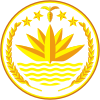Portal:Bangladesh/Old
| This page is currently inactive and is retained for historical reference. Either the page is no longer relevant or consensus on its purpose has become unclear. To revive discussion, seek broader input via a forum such as the village pump. |
Bangladesh portal
Bangladesh, officially the People's Republic of Bangladesh, is a country in South Asia. It is the eighth-most populous country in the world and among the most densely populated with a population of 170 million in an area of 148,460 square kilometres (57,320 sq mi). Bangladesh shares land borders with India to the north, west, and east, and Myanmar to the southeast. To the south, it has a coastline along the Bay of Bengal. It is separated from Bhutan and Nepal by the Siliguri Corridor, and from China by the mountainous Indian state of Sikkim. Dhaka, the capital and largest city, is the nation's political, financial, and cultural centre. Chittagong is the second-largest city and the busiest port. The official language is Bengali, with Bangladeshi English also used in government. Bangladesh is part of the historic and ethnolinguistic region of Bengal, which was divided during the Partition of British India in 1947 as the eastern enclave of the Dominion of Pakistan, from which it gained independence in 1971 after a bloody war. The country has a Bengali Muslim majority. Ancient Bengal was known as Gangaridai and was a stronghold of pre-Islamic kingdoms. The Muslim conquest after 1204 led to the sultanate and Mughal periods, during which an independent Bengal Sultanate and wealthy Mughal Bengal transformed the region into an important centre of regional affairs, trade, and diplomacy. The Battle of Plassey in 1757 marked the beginning of British rule. The creation of Eastern Bengal and Assam in 1905 set a precedent for the emergence of Bangladesh. The All India Muslim League was founded in Dhaka in 1906. The Lahore Resolution in 1940 was supported by A. K. Fazlul Huq, the first Prime Minister of Bengal. The present-day territorial boundary was established with the announcement of the Radcliffe Line. In 1947, East Bengal became the most populous province in the Dominion of Pakistan and was renamed East Pakistan, with Dhaka as the legislative capital. The Bengali Language Movement in 1952, the 1958 Pakistani coup d'état, and the 1970 Pakistani general election spurred Bengali nationalism and pro-democracy movements. The refusal of the Pakistani military junta to transfer power to the Awami League, led by Sheikh Mujibur Rahman, triggered the Bangladesh Liberation War in 1971. The Mukti Bahini, aided by India, waged a successful armed revolution; the conflict saw the Bangladeshi genocide. The new state of Bangladesh became a constitutionally secular state in 1972, although Islam was declared the state religion in 1988. In 2010, the Bangladesh Supreme Court reaffirmed secular principles in the constitution. The Constitution of Bangladesh officially declares it a socialist state. A middle power in the Indo-Pacific, Bangladesh is home to the fifth-most spoken native language, the third-largest Muslim-majority population, and the second-largest economy in South Asia. It maintains the third-largest military in the region and is the largest contributor to UN peacekeeping operations. Bangladesh is a unitary parliamentary republic based on the Westminster system. Bengalis make up almost 99% of the population. The country consists of eight divisions, 64 districts, and 495 subdistricts, and includes the world's largest mangrove forest. Bangladesh hosts one of the largest refugee populations due to the Rohingya genocide. Bangladesh faces challenges like corruption, political instability, overpopulation, and effects of climate change. Bangladesh has twice chaired the Climate Vulnerable Forum and hosts the Bay of Bengal Initiative for Multi-Sectoral Technical and Economic Cooperation (BIMSTEC) headquarters. It is a founding member of the South Asian Association for Regional Cooperation (SAARC) and a member of the Organization of Islamic Cooperation and the Commonwealth of Nations. (Full article...)
Bangladesh News
Selected articleSelected biography
Selected pictureDid you know
Things you can do
CategoriesSubcategories of Bangladesh: People – Culture – Music – Society – Sport – Religion – Geography – Divisions – Subdivisions – Districts – Cities – History – Politics – Infrastructure – Transportation – Economy – Education – Science and technology – Health – Environment – Government – Law – Politics – Military – Communications – Media – Buildings and structures – Organisations – Companies See also:
Wikipedia in Bengali
Related portalsReligions in Bangldesh Indian Subcontinent Other countries Associated WikimediaThe following Wikimedia Foundation sister projects provide more on this subject:
| |||||||















